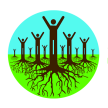The Truth About Depression
You're not a machine with broken parts. You're a human being with unmet needs.
All throughout my lifetime, year after year, serious depression and anxiety have risen across the Western world. Why is it that with each year that passes, more and more of us are finding it harder to get through the day?
So far, we have scientific evidence for nine different causes of depression and anxiety. Two of them are indeed in our biology. But most of the factors that have been proven to cause depression and anxiety are not in our biology. They are factors in the way we live.
Why do we exist? One key reason is that our ancestors on the savannas of Africa were really good at one thing. They weren't bigger than the animals they took down, they weren't faster than the animals they took down but they were much better at banding together into groups and cooperating. This was our superpower as a species -- we band together, just like bees evolved to live in a hive, humans evolved to live in a tribe. And we are the first humans ever to disband our tribes. And it is making us feel awful.
Everyone here knows you've all got natural physical needs. You need food, you need water, you need shelter, you need clean air. If I took those things away from you, you'd all be in real trouble, real fast. But at the same time, every human being has natural psychological needs. You need to feel you belong. You need to feel your life has meaning and purpose. You need to feel that people see you and value you. You need to feel you've got a future that makes sense. But we've been getting less and less good at meeting these deep, underlying psychological needs.
For thousands of years, philosophers have said, if you think life is about money, and status and showing off, you're going to feel like crap. The more you believe you can buy and display your way out of sadness, and into a good life, the more likely you are to become depressed and anxious. And secondly, as a society, we have become much more driven by these beliefs all throughout my lifetime under the weight of advertising and Instagram and everything like them.
We've been trained to look for happiness in all the wrong places, and just like junk food doesn't meet your nutritional needs and actually makes you feel terrible, junk values don't meet your psychological needs, and they take you away from a good life.
Isn't this kind of obvious? If I said to everyone here, none of you are going to lie on your deathbed and think about all the shoes you bought and all the retweets you got, you're going to think about moments of love, meaning and connection in your life. At some level, we all know these things. But in this culture, we don't live by them. Because we live in a machine that is designed to get us to neglect what is important about life.
If you're lonely, you're more likely to become depressed. If, when you go to work, you don't have any control over your job, you've just got to do what you're told, you're more likely to become depressed. If you very rarely get out into the natural world, you're more likely to become depressed.
We have to change our understanding of what depression and anxiety actually are. There are very real biological contributions to depression and anxiety, but if we allow the biology to become the whole picture, what we're implicitly saying to people is, "Your pain doesn't mean anything. It's just a malfunction. It's like a glitch in a computer program, it's just a wiring problem in your head." But I was only able to start changing my life when I realized your depression is not a malfunction. It's a signal. Your depression is a signal. It's telling you something.
If you are depressed, if you are anxious, you are not weak, you're not crazy, you're not a machine with broken parts. You're a human being with unmet needs.
We feel this way for reasons, and they can be hard to see in the throes of depression. But with the right help, we can understand these problems and we can fix these problems together. But to do that, the very first step is we have to stop insulting these signals by saying they're a sign of weakness, or madness or purely biological, except for a tiny number of people.
We need to start listening to these signals, because they're telling us something we really need to hear. It's only when we truly listen to these signals that we're going to begin to see the liberating, nourishing, deeper solutions that are waiting all around us.
About the Creator
Sustainable Human
Sustainable Human is a US 501c3 non-profit. Our mission is to harness the power of video storytelling to evolve human consciousness such that humanity is capable of living in harmony with each other and the biosphere.
sustainablehuman.org






Comments
There are no comments for this story
Be the first to respond and start the conversation.